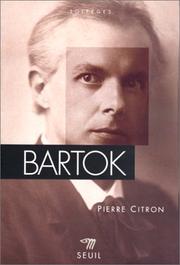| Listing 1 - 4 of 4 |
Sort by
|

ISBN: 2020184176 9782020184175 Year: 1994 Publisher: [Paris] : Editions du Seuil,
Abstract | Keywords | Export | Availability | Bookmark
 Loading...
Loading...Choose an application
- Reference Manager
- EndNote
- RefWorks (Direct export to RefWorks)
Composers --- Compositeurs --- Biography --- Biographies --- Bartók, Béla, --- Biography. --- Bartók, Béla, --- Composers - Hungary - Biography.
Book
ISBN: 9633302757 9789633302750 Year: 1979 Publisher: Budapest Musica
Abstract | Keywords | Export | Availability | Bookmark
 Loading...
Loading...Choose an application
- Reference Manager
- EndNote
- RefWorks (Direct export to RefWorks)
Biografie, werken en discografie van 86 20e eeuwse, Hongaarse componisten
Music --- anno 1900-1999 --- Hungary --- Composers --- Biography --- Bio-bibliography --- -Composers --- -Music --- -Art music --- Art music, Western --- Classical music --- Musical compositions --- Musical works --- Serious music --- Western art music --- Western music (Western countries) --- Songwriters --- Musicians --- -Bio-bibliography --- -Songwriters --- Art music --- 78.03 --- Composers - Hungary - Biography --- Music - Hungary - Bio-bibliography
Book
Abstract | Keywords | Export | Availability | Bookmark
 Loading...
Loading...Choose an application
- Reference Manager
- EndNote
- RefWorks (Direct export to RefWorks)
"Au-delà des chapelles, des clans, des écoles et du cercle toujours étroit des musiciens contemporains, la musique de György Ligeti (1923-2006) a su trouver une large audience. Les textures inouïes, sidérales, des grandes oeuvres pour orchestre Apparitions (1958-1959), Atmosphères (1961), Lontano (1967), Melodien (1971), le sens dramatique profond révélé dans une multitude de prismes allant de la dérision ostentatoire (Aventures, 1962) jusqu'à la plus pure suggestion intérieure (Études pour piano, 1985-2001) en passant par la geste opératique tragique (Requiem, 1963-1965) ou bouffonne (Le Grand Macabre, 1974-1977) prisme fondé sur une poétique des rythmes qui en avive la perception en profondeur ( Continuum, 1968 ; Clocks and Clouds, 1972-1973 ; Concerto pour piano, 1980-1988), ainsi qu'un rapport unique aux timbres, à leur plasticité, à leur sensualité (Concerto de chambre, 1969-1970 ; Concerto pour violon, 1989-1993 ; Sippal, Dobbal, Nàdihegeduvel, 2000) lui ont permis de capter un vaste public grâce d'autant plus puissante que rare. Avec une empathie de compositeur, Karol Beffa met ici en perspective les périodes créatrices de György Ligeti, de ses débuts, dominés par l'admiration de Bartók, confrontés aux tragédies du XXe siècle, à l'accomplissement atteint en Europe de l'Ouest. Les différents foyers dans lesquels il put s'épanouir (Cologne et son Studio de musique électronique, l'avant-gardiste Darmstadt, la dadaïste Dùsseldorf, Hambourg où il enseigna la composition) sont évoqués ici comme les jalons façonnant une personnalité radicalement indépendante, dont les modèles pour la création étaient aussi bien littéraires et picturaux que musicaux."--Page 4 de la couverture.
Composers --- Compositeurs --- Ligeti, György, --- Critique et interprétation. --- Opera --- Avant-garde (Music) --- Opéra --- Musique expérimentale --- Biography. --- Biographies --- Biography --- Ligeti, György, --- Hungary --- Opéra --- Musique expérimentale --- Ligeti, György --- Composers - Hungary - Biography --- Ligeti, György, - 1923-2006 --- Ligeti, György (1923-2006) --- Muziekgeschiedenis --- 20e eeuw

ISBN: 1282759361 9786612759369 0520932056 9780520932050 0520245032 9780520245037 9781282759367 6612759364 Year: 2006 Volume: 5 Publisher: Berkeley University of California Press
Abstract | Keywords | Export | Availability | Bookmark
 Loading...
Loading...Choose an application
- Reference Manager
- EndNote
- RefWorks (Direct export to RefWorks)
It is well known that Béla Bartók had an extraordinary ability to synthesize Western art music with the folk music of Eastern Europe. What this rich and beautifully written study makes clear is that, contrary to much prevailing thought about the great twentieth-century Hungarian composer, Bartók was also strongly influenced by the art-music traditions of his native country. Drawing from a wide array of material including contemporary reviews and little known Hungarian documents, David Schneider presents a new approach to Bartók that acknowledges the composer's debt to a variety of Hungarian music traditions as well as to influential contemporaries such as Igor Stravinsky. Putting representative works from each decade beginning with Bartók's graduation from the Music Academy in 1903 until his departure for the United States in 1940 under critical lens, Schneider reads the composer's artistic output as both a continuation and a profound transformation of the very national tradition he repeatedly rejected in public. By clarifying why Bartók felt compelled to obscure his ties to the past and by illuminating what that past actually was, Schneider dispels myths about Bartók's relationship to nineteenth-century traditions and at the same time provides a new perspective on the relationship between nationalism and modernism in early-twentieth century music.
Music --- Composers --- Art music --- Art music, Western --- Classical music --- Musical compositions --- Musical works --- Serious music --- Western art music --- Western music (Western countries) --- History and criticism. --- Bartók, Bela, --- Bartokas, B., --- Criticism and interpretation. --- Compositeurs --- Musique --- Biographies --- Histoire et critique --- Bartók, Béla, --- Bartók, Béla, --- Bartók, Béla, -- 1881-1945 -- Criticism and interpretation.. --- Composers -- Hungary -- Biography.. --- Music -- Hungary -- 20th century -- History and criticism. --- 1900s. --- 1940s. --- 19th century. --- 20th century composer. --- 20th century music. --- academic. --- composer. --- eastern europe. --- european history. --- folk music. --- folk stories. --- folk tales. --- folklore. --- hungarian composer. --- hungarian music. --- hungary. --- igor stravinsky. --- modernism. --- music academy. --- musical tradition. --- nationalism. --- scholarly. --- traditional music. --- western art. --- western music. --- western world.
| Listing 1 - 4 of 4 |
Sort by
|

 Search
Search Feedback
Feedback About UniCat
About UniCat  Help
Help News
News